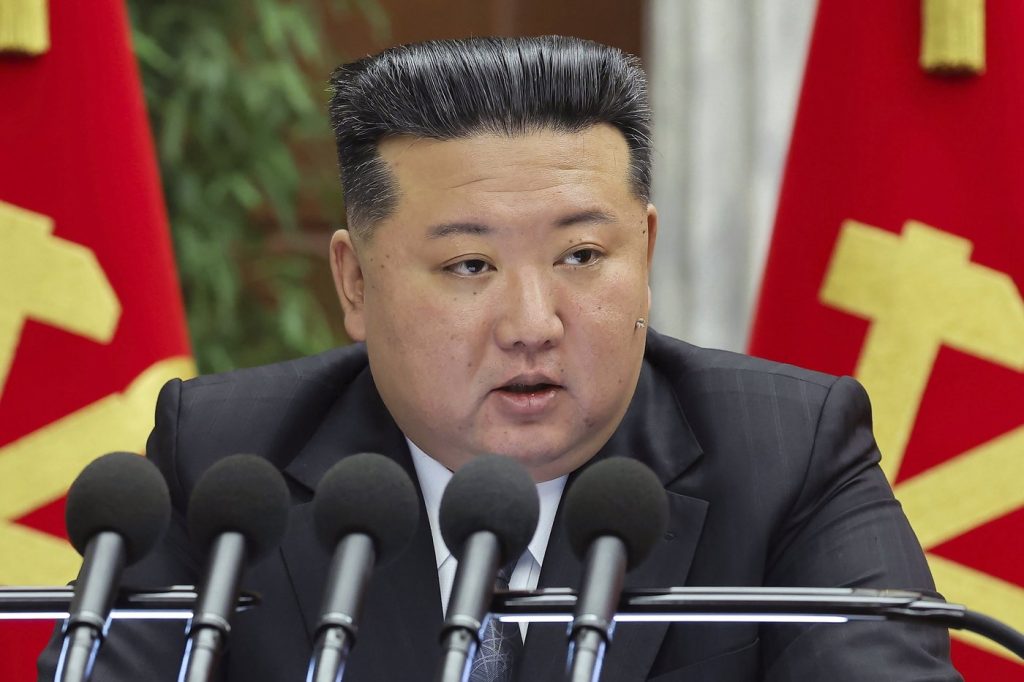SEOUL, South Korea (AP) - On Tuesday, North Korea issued a sharp criticism towards the United States and its Asian allies, denouncing their "absurd" aims to denuclearize the country. The statements came from Pyongyang's Foreign Ministry following a meeting between the top diplomats from the U.S., South Korea, and Japan at a security conference held in Munich, Germany. The trio reaffirmed their commitment to enhancing military collaboration and reinforcing international sanctions to counter North Korea's expanding nuclear capabilities.
In their remarks, the North Korean ministry accused the U.S. of attempting to implement an "outdated and absurd plan" aimed at denuclearizing the country. They warned of "overwhelming and decisive counteraction" if they feel their security is threatened. The statement emphasized North Korea's unwavering determination to "consistently adhere" to the new directive of strengthening its nuclear armament as established by leader Kim Jong Un. The ministry asserted that the North would effectively deter any threats or coercion that jeopardize its sovereignty.
The latest comments from North Korea reflect a broader discontent with U.S. policies, although state media has notably refrained from directly naming U.S. President Donald Trump. During Trump’s first term, he engaged in unprecedented summits with Kim Jong Un, making significant diplomatic overtures. However, the U.S. Secretary of State Mark Rubio reiterated the commitment to North Korea’s "complete denuclearization" alongside his South Korean and Japanese counterparts in their Munich meeting. They emphasized the importance of maintaining an effective sanctions regimen targeting North Korean weaponry.
Following the constructive dialogues of 2018 and 2019, the diplomatic relationship between North Korea and the U.S. has sharply deteriorated. The negotiations collapsed primarily due to disagreements over sanctions relief and nuclear disarmament milestones. Since then, North Korea has refrained from engaging in meaningful discussions with both Washington and Seoul and has intensified its military activities and missile testing, which Kim argues are a response to perceived aggressive threats from the U.S.
In addition to its ongoing tensions with the U.S., North Korea is focusing on establishing a closer foreign policy alliance with Russia. Reports indicate that Kim Jong Un has supplied weaponry and military support to Russia amidst its invasion of Ukraine. This shift in focus has raised concerns in Seoul regarding the potential for an economic exchange that might bolster North Korea's military capabilities in return for supporting Russia’s efforts in Ukraine.
The state-run Korean Central News Agency (KCNA) reported on Monday that a diplomatic delegation, led by Kim Ik Song, director of the Bureau for Affairs with Diplomatic Corps, had departed for Russia. The specific agenda for their meetings was not disclosed, but the ongoing collaboration between North Korea and Russia signals a strategic pivot of North Korea's international engagements
While speculation surrounding the potential resurgence of summit-driven diplomacy with Trump has surfaced following his election win, analysts suggest that a swift return to the dynamics of 2018 is improbable. This skepticism arises from significant shifts in regional security scenarios and the complex geopolitical landscape shaped by Russia's ongoing war in Ukraine, which intertwines with North Korea's nuclear aspirations.
The complexities of North Korea’s nuclear ambitions are now positioned within a broader framework of global challenges, heightened by the war in Ukraine and reduced enforcement of sanctions against Pyongyang. Additionally, there are concerns about Kim’s efforts to strengthen ties with Russia as they work together to form a united front against the U.S. This might increase in momentum especially if Trump's policies, aimed at recalibrating global trade relations, lead to a renewed trade conflict with China, North Korea's principal ally.











